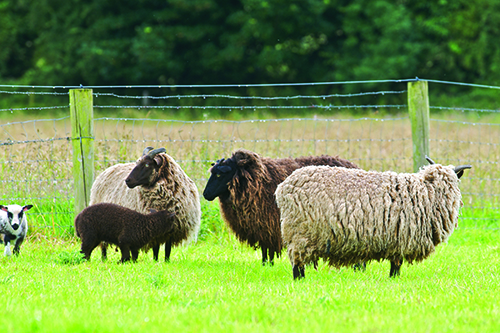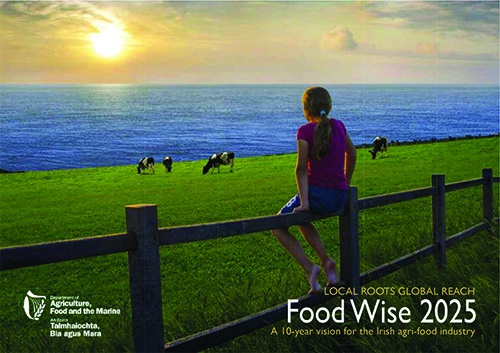A vision for success
 A look at Food Wise 2025, the Department of Agriculture, Food and the Marine’s plan to grow the Irish agricultural economy over the next decade.
A look at Food Wise 2025, the Department of Agriculture, Food and the Marine’s plan to grow the Irish agricultural economy over the next decade.
Food Wise 2025 is the Department of Agriculture, Food and the Marine’s plan to grow the Irish agricultural economy. It sets out the practical ways in which aspirations for growth can be made and how to support the sector as it strives for new levels of success in the decades ahead.
Agri-food is Ireland’s oldest and largest indigenous industry, deeply embedded in the landscape, history and personality of the country. It encompasses everything from primary agriculture to food and beverage production, from fisheries and fish processing to forestry and forestry outputs. The industry provides quality, safe nutritious food to consume in at least 175 countries around the world. The sector is also the main driver of the Irish economy in many rural areas and, in terms of direct and indirect employment and wealth creation, its impact across the country is unparalleled.
However, the local impact is only one side of the story. The sector’s focus on international export markets has been a longstanding one. The recent renewal in export growth has been unprecedented and resulted in a sharp growth in Irish food and drink exports in the years 2010 to 2014. This strong growth sits in stark contrast to many other sectors that suffered at the hands of the recession and has positioned the agri-food industry at the heart of Ireland’s journey to economic recovery. It is against this backdrop that the Food Wise 2025 strategy has been developed.
The strategy can be seen as a framing document, it represents the shared voice of an industry striving to create a business and regulatory environment in which, “extensive growth opportunities over the next 10 years can be fully capitalised on.”
Opportunity
The strategy has identified significant growth opportunities across all subsectors of the Irish agri-food industry. It notes the potential for exports to grow by 85 per cent to €19 billion per annum by 2025 thanks to an expansion in dairy, beef, seafood and consumer food and drink exports. The result of this growth, will, it is hoped see the Gross Added Value of the sector climb to 70 per cent.
This increase in exports and in value added outputs will increase direct employment in the sector, with the potential for up to 23,000 additional jobs. The added benefit of these jobs is that unlike many other sectors, the jobs will be spread nationwide and ensure a significant further spin off in terms of the creation of indirect employment.
Sustainability
While there is an obvious financial benefit to the sector’s growth, the strategy is aware that any growth cannot be considered in isolation from the environmental impact it would have. Factors such as the depletion of natural resources and the potential further impact on climate change will be taken into account. To combat these challenges, Food Wise 2025 claims that the focus must be evenly split between managing and sustaining the natural resources and on increasing production.
To do this, the strategy emphasises the need to make more of Ireland’s competitive advantage. According to the strategy, Ireland’s temperate climate favours a grass based livestock production system that is one of the more efficient and environmentally sustainable intensive feed systems. A guiding principle of the strategy will ensure that environmental protection and economic competiveness are equal and complimentary and that the three pillars of sustainability – social, economic and environmental – are equally important.
Further underlining its support for sustainable development the strategy asserts that it must be based on the latest scientific evidence and ensure that the aims of delivering public goods, economic growth and sustainable rural local communities work hand in hand. In the development of the Food Wise 2025 strategic document, a Strategic Environmental Assessment and an Appropriate Assessment for Natura 2000 areas were conducted.
Delivering growth
The strategy has identified a number of areas that require strategic action. These are:
• the attraction, retention and development of talent right along the supply chain;
• a greater focus on market development that is consumer-insight driven, to ensure Irish products are targeted at the right markets and the right segments within those markets.
• productivity improvements that are driven by innovation and the adoption of the latest technologies;
• value addition to sustainably produced primary materials, which will support local government growth, ensure the viability of local producers and protect the environment and natural resources.
To address these areas the strategy has identified a number of cross cutting categories such as human capital, competitiveness, market development and innovation as well as a number of additional sector specific recommendations.
Competitiveness
Food Wise 2025 recognises that for all of this to be achieved, Ireland, due to its size, will constantly need to maintain a focus on its global competitiveness. The market’s impressive growth over the last five years will, the strategy explains, require concerted efforts to improve competitiveness and productivity if it is to be maintained.
Both producers and processors have their parts to play. For producers, it should be clear that future profitability and viability will be driven by productivity improvements thanks to the use of cutting-edge sustainable processes and technologies. As such, investment in  the development of new technologies must be a cornerstone of achieving future growth at primary production level. While for producers their economies of scale will need to be addressed. This will require measures to support land mobility and consolidation in agriculture, as well as access to additional raw materials in the seafood sector.
the development of new technologies must be a cornerstone of achieving future growth at primary production level. While for producers their economies of scale will need to be addressed. This will require measures to support land mobility and consolidation in agriculture, as well as access to additional raw materials in the seafood sector.
Conclusion
Ultimately, the strategy sets an ambitious, informed and achievable course based around the learning that has happened over the last number of years thanks to the Food Harvest 2020 programme. It is hoped that the projects set out by the strategy will build on the achievements of the last few years and allow the agri-food industry to truly realise its potential. For their part, the members of the Food Wise 2025 Committee are looking forward to a decade of growth under this strategy and claim that to ensure the effective delivery of this programme the department will lead a dynamic implementation process to deliver on the ambition of Food Wise 2025.





